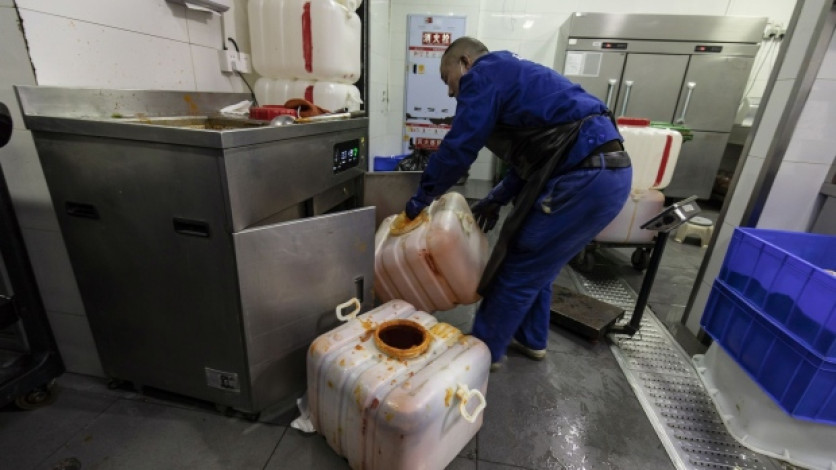
(Bloomberg) -- There’s a ritual involved in creating the perfect Sichuan hot pot and it involves fat — lots of it. Diners first immerse slivers of meat in a spicy soup rich in molten animal tallow, then dip each morsel in a plate of vegetable oil, before finally devouring it. It’s a rich delicacy, one that produces about 12,000 tons of waste oil each month in the Chinese city of Chengdu alone.
So in 2016, a startup began exporting some of that leftover restaurant grease to Europe and Singapore, where it gets recycled into fuel pure enough to fly airplanes.
Responsible for around 2% of the world’s total emissions of planet-warming gases, the aviation industry is under pressure to find greener ways to power its jet engines. Several major airlines including British Airways, Cathay Pacific Airways Ltd. and Delta Air Lines Inc., have pledged to replace about 10% of their jet fuel with a sustainable alternative by 2030, and more than 50 have begun to experiment with it, but cleaner substitutes are still being developed.
Waste oil from kitchens is emerging as a major source of sustainable jet fuel because it doesn’t displace food production or encourage deforestation to make way for crops. And China, with its large population and love for super-greasy hot pots, is already the largest exporter.
“Our mission is to make gutter oil fly to the sky,” said Zhong Guojun, vice president of Sichuan Jinshang Environmental Technology, which is behind the project.
The Chengdu-based company collects used oil, mostly from hot pot restaurants in the Sichuan capital of 16 million, and removes impurities such as sodium and metal particles. Its end product is a biofuel precursor usually called industrial mixed oil, which is then packed on ships that sail east along the Yangtze River to the port of Shanghai, from where it’s exported to Neste Oyj, the world’s largest producer of sustainable aviation fuel, and to global energy giants including BP Plc and Eni SpA, to be further refined into biodiesel or jet fuel.
Originally set up during China’s food safety crisis to stop contaminated “gutter oil” from being filtered and sold back to food vendors, Jinshang began to export the leftover fat for industrial use in 2016, when demand for biofuels from international refiners first took off.
China consumes more edible oil than any other country — more than 41 million tons a year. So far, less than 3 million tons of it ends up in the supply chain for biodiesel, a major type of biofuel that’s surged in price amid rising European demand, according to a report by state-owned People’s Daily last year. That leaves a lot of room for growth, especially as governments and industry regulators tighten rules to meet emissions targets that are key to averting catastrophic global warming.
The International Civil Aviation Organization launched a carbon offsetting and reduction scheme in 2016 that encourages the use of sustainable fuels in addition to technical and operational improvements. The European Union is also tightening its rules, introducing new requirements that its planes and airports blend in 5% sustainable aviation fuels by 2030, gradually rising to 85% in 2050.
Sustainable aviation fuel remains much more expensive than its conventional counterpart but those targets are forcing airlines to respond, with some teaming up with startups developing cleaner technologies.
“When there is a demand, the supply will catch up, and the demand is already here,” said Chong Cheng Tung, Associate Professor at the China-UK Low Carbon College, Shanghai Jiao Tong University. “So either you switch your fuel to green fuel, like bio-jet fuel, or you have to pay a lot of premium for traveling.”
Neste last year announced plans to invest 1.9 billion euros ($2.05 billion) to expand its renewable product capacity; it aims to be able to produce 1.2 million tons of sustainable jet fuel per year in 2026. And while there were only two firms in the world making sustainable aviation fuel at a commercial scale before 2021, several big players, including TotalEnergies SE, Chevron Corp, Eni, and BP have since begun small-scale production and plan to ramp up, according to BloombergNEF.
“These companies will need to buy more waste cooking oil, and the Chinese market will for sure see growth,” said Ye Hao, head of Jinshang’s global business team.
Read more:
Global Aviation’s Best Shot at Going Green Relies on Scarce Fuel
Jinshang aims to nearly double its production capacity this year by building new facilities and collecting more oil from provinces beyond Sichuan, the company said. It also plans to build facilities to refine the gutter oil into biofuel itself.
Rising demand from airlines could eventually outstrip China’s appetite for spicy hot pots, however. Waste fats, oils, and greases may be able to meet just over 4% of global demand for jet fuel by 2030, according to BloombergNEF’s estimates.
“When we reach capacity and all these food waste oils have been utilized,” said Chong, “then we have to look for other feedstocks.”
Source:
Online/GFMM
Comment Now